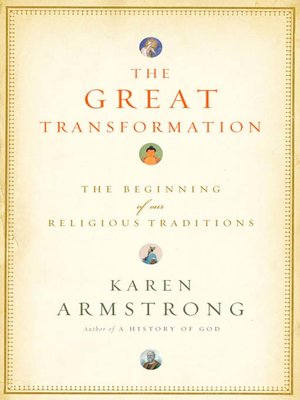
Sign up to save your library
With an OverDrive account, you can save your favorite libraries for at-a-glance information about availability. Find out more about OverDrive accounts.
Find this title in Libby, the library reading app by OverDrive.



Search for a digital library with this title
Title found at these libraries:
| Library Name | Distance |
|---|---|
| Loading... |
NATIONAL BESTSELLER • An extraordinary investigation of a critical moment in the evolution of religious thought—from the New York Times bestselling author of A History of God and The Spiral Staircase
“A splendid book.... Lucid, highly readable.... Relevant to a world still embroiled in military conflict and sectarian hatreds.” —The New York Times
In the ninth century BCE, events in four regions of the civilized world led to the rise of religious traditions that have endured to the present day—development of Confucianism and Daoism in China, Hinduism and Buddhism in India, monotheism in Israel, and philosophical rationalism in Greece. Armstrong, one of our most prominent religious scholars, examines how these traditions began in response to the violence of their time. Studying figures as diverse as the Buddha and Socrates, Confucius and Jeremiah, Armstrong reveals how these still enduring philosophies can help address our contemporary problems.
“A splendid book.... Lucid, highly readable.... Relevant to a world still embroiled in military conflict and sectarian hatreds.” —The New York Times
In the ninth century BCE, events in four regions of the civilized world led to the rise of religious traditions that have endured to the present day—development of Confucianism and Daoism in China, Hinduism and Buddhism in India, monotheism in Israel, and philosophical rationalism in Greece. Armstrong, one of our most prominent religious scholars, examines how these traditions began in response to the violence of their time. Studying figures as diverse as the Buddha and Socrates, Confucius and Jeremiah, Armstrong reveals how these still enduring philosophies can help address our contemporary problems.






